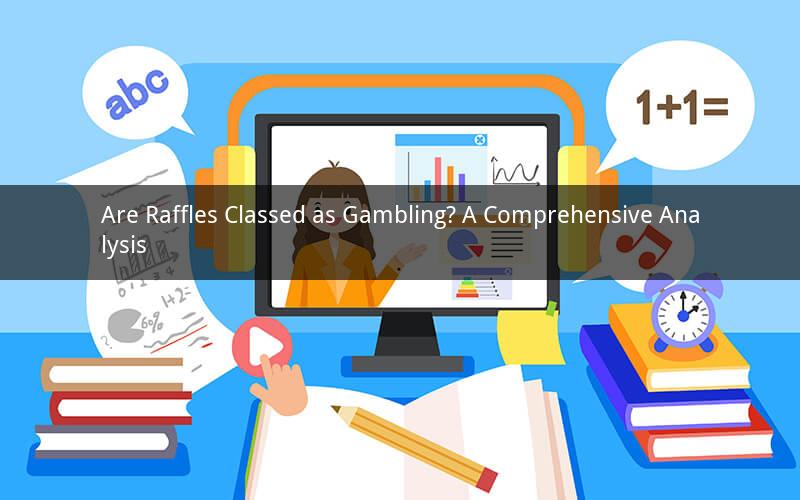
Raffles, a popular form of fundraising and entertainment, often raises questions about its classification as gambling. This article delves into the nature of raffles, the legal definitions of gambling, and the arguments for and against classifying raffles as gambling. We will also explore the implications of such classification on the raffle industry and its participants.
I. Understanding Raffles
Raffles are events where participants purchase tickets with the hope of winning prizes. These events are commonly organized by schools, charities, and businesses to raise funds for various causes. The process involves selling tickets, drawing winners, and distributing prizes.
Raffles can vary in format, ranging from simple drawings to elaborate auctions. The prizes can be anything from small items like gift cards to luxurious cars or even vacation packages. The key aspect of a raffle is the element of chance, as winners are determined randomly.
II. Legal Definitions of Gambling
To determine whether raffles are classified as gambling, it is essential to understand the legal definitions of gambling. The definition of gambling varies by jurisdiction, but most legal systems consider gambling to involve the following elements:
1. Risk: Participants must risk something of value (usually money) on an uncertain outcome.
2. Prize: There must be a prize or reward for the winner.
3. Chance: The outcome of the event must depend on chance rather than skill.
III. Arguments for Classifying Raffles as Gambling
Proponents of classifying raffles as gambling argue that they meet the criteria outlined in the legal definitions of gambling. Here are some of the main arguments:
1. Risk and Prize: Participants purchase tickets with the intention of winning a prize, which involves risking their money on an uncertain outcome.
2. Chance: The winners are determined randomly, which means the outcome depends on chance rather than skill.
3. Potential for Addiction: Raffles can be addictive, as participants may feel compelled to buy more tickets in the hope of winning.
IV. Arguments Against Classifying Raffles as Gambling
Opponents of classifying raffles as gambling argue that they do not meet the legal definitions of gambling. Here are some of the main arguments:
1. Non-Monetary Risk: Participants can often enter raffles without spending money, as some events offer free entries or "sweepstakes" raffles.
2. Beneficial Purpose: Raffles are often organized for charitable or educational purposes, which sets them apart from traditional gambling.
3. Lack of Addiction Potential: Raffles are generally considered a form of entertainment rather than a gambling activity, and they do not have the same potential for addiction as other forms of gambling.
V. Implications of Classification
The classification of raffles as gambling has significant implications for the raffle industry and its participants. Here are some potential consequences:
1. Legal Restrictions: If raffles are classified as gambling, organizers may face legal restrictions on the types of events they can hold and the prizes they can offer.
2. Tax Implications: The classification of raffles as gambling could affect the tax treatment of raffle proceeds.
3. Organizational Challenges: Raffle organizers may need to comply with additional regulations and reporting requirements if raffles are classified as gambling.
VI. Conclusion
The classification of raffles as gambling is a complex issue that depends on the specific legal definitions and interpretations of gambling in a given jurisdiction. While some argue that raffles meet the criteria of gambling, others contend that their purpose and nature distinguish them from traditional gambling activities. Ultimately, the classification of raffles will have significant implications for the raffle industry and its participants.
Questions and Answers:
1. Q: What is the primary difference between a raffle and traditional gambling?
A: The primary difference is that raffles are often organized for charitable or educational purposes, while traditional gambling is primarily for profit.
2. Q: Can raffles be classified as gambling in all jurisdictions?
A: No, the classification of raffles as gambling varies by jurisdiction, as the legal definitions and interpretations of gambling differ.
3. Q: Are there any legal consequences for organizing a raffle that is classified as gambling?
A: Yes, organizers may face legal restrictions, tax implications, and additional reporting requirements if a raffle is classified as gambling.
4. Q: Can raffles be addictive?
A: Yes, raffles can be addictive, as participants may feel compelled to buy more tickets in the hope of winning.
5. Q: How can organizers ensure that their raffles are not classified as gambling?
A: Organizers can ensure that their raffles are not classified as gambling by adhering to the legal definitions of gambling and avoiding elements like monetary risk and addiction potential.